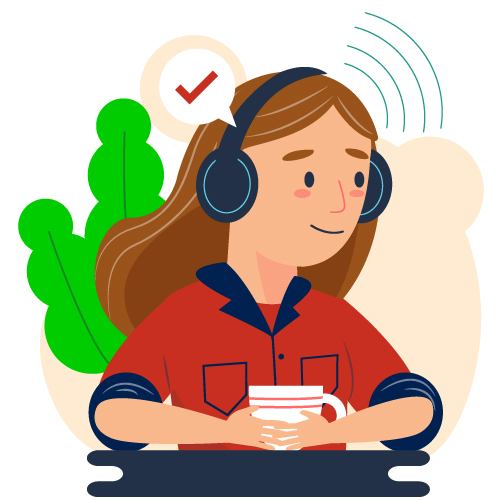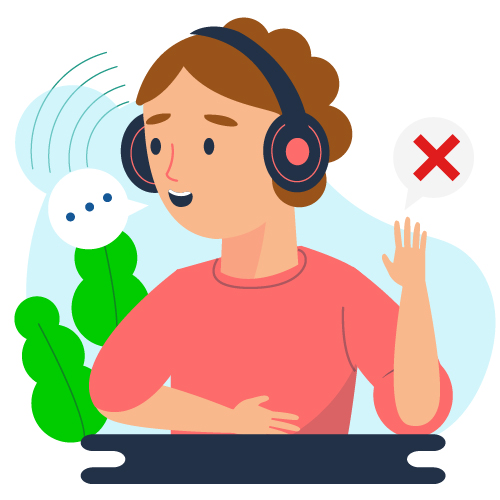
Top 10 tips to improve your IELTS Listening
There are valuable IELTS Listening Tips on the web and in preliminary courses and heaps of recordings regarding how to support your IELTS Listening score. Prevailing in this part is critical on the off chance that you intend to apply for top US colleges.
The Listening piece of the IELTS comes in four sections. Each part manages an alternate subject, and they get progressively troublesome as they progress.
Social setting (2 speakers):
The principal sound is by and large a casual discourse in a social circumstance. It very well may be tied in with sending a bundle at a mailing station or somebody getting some information about taking a crack at a class.
Social setting (1 speaker):
The subsequent sound comes as a monologue for the most part. It very well may be somebody addressing a gathering of travellers on a visitor data on a gallery show.
Academic setting (2-4 speakers):
The third sound is a discussion between a gathering of individuals examining scholarly matters. It might incorporate a conversation encompassing a gathering task or task, including students and an educator.
Academic setting (1 speaker):
Finally, you’ll hear a college address in the fourth sound. You’ll, without a doubt, observe this to be the most troublesome sound to track with as it could identify with any scholastic point under the sun.
You don’t require any detailed information in the scholarly field, as all answers mentioned will be given to you in the sound accounts.
The whole Listening test keeps going 40 minutes: 30 minutes of tuning in and 10 minutes to permit you to respond to the distinctive inquiry type. So 40 inquiries are taking all things together.
Getting band 9 for IELTS Listening is conceivable?
The appropriate response is Yes! You want to do a few things before the test and a few things you want to focus on the test. You can impressively work on your score by following these tips and even get a band 9! You will find here the top 10 IELTS Listening tips to get an ideal score on the IELTS Listening test:
Before the test
Further, develop your overall listening abilities.
The objective of the IELTS Listening area is to test your listening abilities. Try not to utilize practice tests to work on your score: it’s insufficient! They will assist you with getting comfortable with the test yet won’t much further develop your listening capacities. It is significantly more viable to do different listening works out, pay attention to general listening materials (radio reports, TV shows, documental projects and so forth) and solely after that do IELTS Listening practice tests.
Clean your subject jargon
Area 3 is quite often about instruction. For instance, students and a coach discuss a task. Gain proficiency with all the jargon you can about learning at college. This way, you will comprehend this segment better.
On the test
Word types
Skirt the inquiries and conclude which kind of word fits in each hole. Is it a thing, action word, modifier or descriptor? Compose ‘N’ for something, ‘V’ for action word, etc. It will assist you with zeroing in on the particular word structures while tuning in.
“Plugin” the circumstance
Attempt to find out about the circumstance. Before each part, you will be given a short presentation: ‘Presently, you will hear a discourse between… ‘ or ‘you will hear a talk on… ‘ This data isn’t composed on the inquiry paper, so be mindful. Note: who are the speakers, why they are talking, and where are they. It will make understanding the remainder of the recording a lot more straightforward.
Try not to free consideration.
Keep in mind; you will hear the sound once. So assuming that you didn’t hear a few words and ignored a few inquiries, relax! Leave them clear and spotlight on the genuine part. Audit those inquiries toward the finish of the piece; if not, you will miss more inquiries and tangle in the recording. You should peruse, compose and listen all simultaneously.
Keep an eye out for words-pointers.
Tune in for words-pointers, for example, notwithstanding, however at that point, at last. They assist you with expecting what the speaker will say.
Try not to compose answers excessively fast.
Many students fall into this snare: they take it for the proper reply when they hear the required data. In any case, this data is rehashed or adjusted further in part once in a while. Model:
Sam: Thank you! I’ve accepted your email. So it is loren-hanson@gmail.com.
Loren: No-no! You have mixed up; it is loren-hamson@gmail.com, spelt with M.
Sam: Oh, I’m grieved…
Check for senseless slip-ups.
Later each part, you have 30 seconds to look at your replies. It is critical to check spelling, plurals and word structures. Recall that central, effectively composed answers will acquire focuses.
Move answers precisely
Toward the finish of the listening test, you will have 10 minutes for moving your replies into the appropriate response sheet. Furthermore, frequently students get puzzled in the numeration! As you record your answers, register that they fit with the right numbered space. All in all, ensure that question 7 goes into space number 7.
Try not to leave any clear replies!
You will not lose marks for mistaken replies, so it is wiser to compose something in the appropriate responses box regardless of whether you know the appropriate response. Then, peruse the inquiry again and make a theory!
Utilize these IELTS Listening tips to develop your Listening abilities further! Yet, remember about IELTS Listening practice as well.



